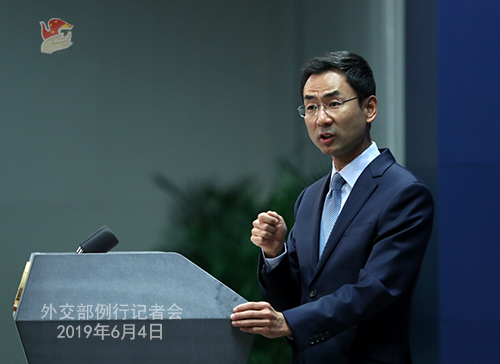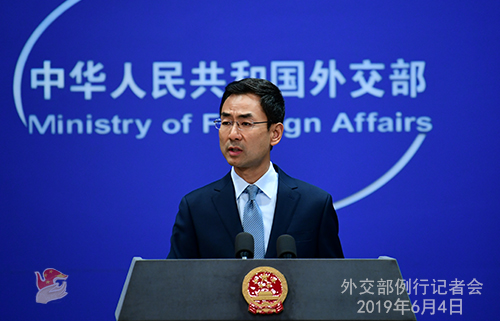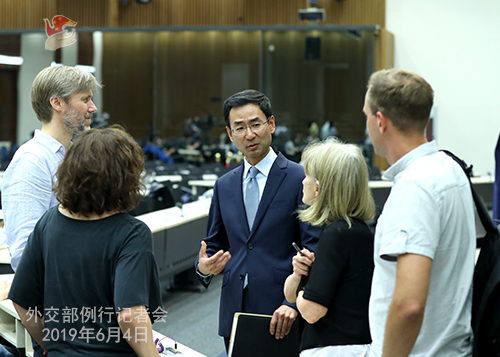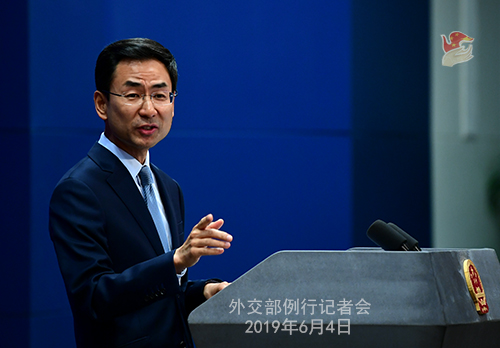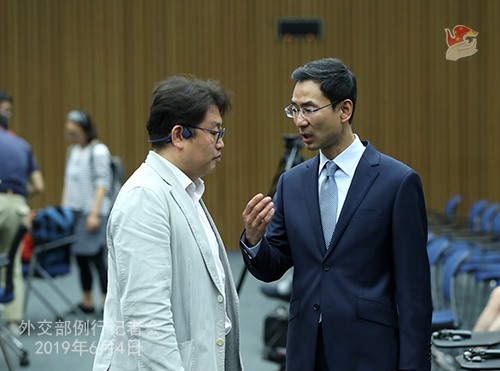| Foreign Ministry Spokesperson Geng Shuang's Regular Press Conference on June 4, 2019 |
| 2019-06-04 22:11 |
|
Q: The US Department of State issued a statement by Secretary Pompeo on the 1989 political disturbance in Beijing. I wonder if you have any comment on that? A: The Chinese government has already drawn a clear conclusion on the political disturbance in the late 1980s. The great achievements we made in the past 70 years since the establishment of the People's Republic of China speak volumes about the right development path we have chosen with the endorsement by our people. The Chinese people will continue to advance along the path of socialism with Chinese characteristics. Secretary Pompeo's statement made vicious accusations on China's political system, human rights and religious conditions, and baselessly criticized China's Xinjiang policy. It grossly interferes in China's internal affairs, tramples the basic norms governing international relations and undermines mutual trust between China and the US. China firmly opposes it and has made stern representations to the US side. Some in the US have long been in the habit of lecturing other countries and interfering in their internal affairs under the pretexts of "democracy" and "human rights" while turning a blind eye to problems at home. Such hypocrisy and ill intentions are already seen through by the Chinese people. They are not at all qualified to accuse China randomly. Any attempt to interfere in China's internal affairs or destabilize our country is doomed to fail. We advise those people to take a good look at themselves in the mirror and keep their own house in order. They need to stop tarnishing China's image, interfering in China's domestic affairs and resorting to words and deeds that undermine trust and cooperation between China and the US. It is high time that they refrained from making more mistakes. Otherwise, they will become nothing but a laughingstock of the world. Q: Someone asked about a giant panda named Xiang Xiang a few days ago. My question is about two giant pandas called Ru Yi and Ding Ding, which China offered to Russia in April this year. As the two sides celebrate 70 years of diplomatic relations and President Xi is about to pay a state visit to Russia, is there any special significance in the giant pandas' trip to Russia? Will the two sides hold any activities for them? A: Indeed. Questions on giant pandas often come up at our press conferences. I think it shows how much people all over the world adore them and how special they are in China's diplomacy. Like you said, in April this year, President Xi Jinping announced China's decision to offer a pair of giant pandas to Russia for joint research during his meeting with President Putin in Beijing. On April 29, Ru Yi and Ding Ding left their hometown in Sichuan for a 15-year expat experience in Russia. Now they have settled down very nicely in the Moscow zoo. Tomorrow President Xi Jinping will begin his state visit to Russia and attend the 23rd St. Petersburg International Economic Forum. During the visit, the two heads of state will attend a rich variety of side events, including an opening ceremony for a panda house for Ru Yi and Ding Ding. The giant panda protection and research program helps China and Russia to better protect endangered species and preserve biodiversity and enhance exchange in science, technology and culture. It is also a powerful symbol of friendship between our two peoples. We wish Ru Yi and Ding Ding health and happiness in their new home in Russia. We hope they will bring much happiness to their Russian hosts, become a bridge of friendship and contribute to the joyous and friendly atmosphere marking the 70th anniversary of bilateral relations.
Q: On June 3, Australian Prime Minister Morrison said during a visit to the Solomon Islands that his country will provide 250 million Australian dollars in aid over the next decade for infrastructure spending. Some commentators believe Prime Minister Morrison's decision aims to contain China's growing influence in the region. I wonder if you have any comment? A: First I'd like to make it clear: the Pacific Islands region is not any country's "sphere of influence". Second, China welcomes the normal cooperation and friendly relations between regional countries. We are pleased that Australia offers to help Pacific Island countries to speed up their development, and we hope Australia will honor its commitments. Third, in recent years, committed to pursuing the greater good and shared interests and to the principle of sincerity, real results, amity and good faith, China has been actively carrying out mutually beneficial cooperation with Pacific Island countries, which is warmly welcomed by their governments and peoples. We would like to work with all countries including Australia for better development of the island countries and peace and stability in the region. Q: Reports say that Australian National University had its student record hacked and I'd like to ask if China is responsible for that hack? A: I'm not aware of that. I wonder why China is always blamed for such issues. Before accusing others, we hope the relevant countries can at least get the facts straight. As we repeatedly stated, cyber attacks feature anonymity and are difficult to trace, of which China is also a victim. Countries need to jointly uphold cyber security on the basis of equality and mutually-beneficial cooperation.
Q: US Trade Representative's Office and the Treasury Department said in a joint statement that the United States was disappointed at the White Paper recently issued by China, namely China's Position on the China-US Economic and Trade Consultations. They noted again that Chinese negotiators had "backtracked" and said the impetus for their actions is to stop China's unfair trade practices. Do you have any comment on that? A: The US statement is full of sophistry that confounds black and white. China issued a White Paper on June 2, namely China's Position on the China-US Economic and Trade Consultations. It offers a complete and accurate account of the whole process of consultations and presents the facts and truth. As it clearly states, every setback in the trade talks was caused because the US side was flip-flopping and breaking commitments. Its accusation on China's "backpedaling" is merely an attempt to distort the facts and blame the innocent party for its own wrongdoing. In response to the US accusation on China's "unfair trade practices", China issued The Facts and China's Position on China-US Trade Friction on September 24 last year, which was an authoritative response and refutation to the baseless blames by the US on trade deficit, intellectual property rights and technology transfer. The latest US statement is nothing but singing the same old tune again. I advise the US side to carefully read China's White Papers and stop being so engrossed in self-righteousness and make-belief. I'd like to stress again that dialogue and consultation holds the key to the settlement of trade frictions. A win-win agreement based on mutual respect, equality and good faith serves not only the interests of China and the US, but also the common aspiration of the world. Additional tariffs will not make America "great again". On the contrary, the US will only get hurt. China has the resolve and capability to defend its own legitimate rights and interests. We hope the US can grasp the situation, return to the right track and meet China halfway as soon as possible. Q: Sudan used military force to break up a weeks-long sit-in, leaving more than 30 dead on Monday. Does China have any comment? A: China notes the latest development in Sudan. We hope it can maintain stability, smoothly carry out the political transition and get onto the track of normal development as soon as possible.
Q: We note that yesterday China's Ministry of Education issued a warning on studying in the US. The US has denied what it called groundless accusations from China but has not taken any action. Do you have a response to that? Also, we just noted the first safety reminder for Chinese tourists to the US issued by the Ministry of Culture and Tourism. What message is China trying to send with these two warnings? A: Relevant authorities have already responded to questions on yesterday's warning by the Ministry of Education. Regarding the US response, the US knows better than anyone the things it has done, the barriers set up and their impact. For some time, the US has been politicizing normal education exchange and cooperation with China on the pretext of the so-called "China threat" and "Chinese infiltration". For example, it falsely accuses Confucius Institutes as a tool to expand political influence and spread Chinese values, accuses some Chinese students and academics of carrying out "non-conventional espionage activities" and wantonly harasses them, and imposes visa restrictions on Chinese students majoring in certain disciplines. It reviewed and revoked some Chinese citizens' visa under the pretext of counterintelligence and recently canceled the 10-year visa for some Chinese academics studying China-US relations. These examples show clearly how US actions have severely affected bilateral exchange in education and other people-to-people and cultural sectors. I need to emphasize that China always supports international student exchange and other education and people-to-people cooperation, including with the US. However, such cooperation should not be one-way, but should be based on mutual readiness and mutual respect. As to the tourism reminder issued by the Ministry of Culture and Tourism this afternoon, I believe it is only necessary in light of current circumstances. China would not have done so were it not necessary. For some time, US law enforcement agencies have been harassing Chinese citizens with interrogation upon entry or exit and on-site interviews, among other forms. Therefore the Ministry of Culture and Tourism issued the tourism reminder, and the Ministry of Foreign Affairs and the Chinese Embassy and consulates in the US decided to issue the safety reminder to raise safety awareness. That, I believe, is what a responsible government should do. At the same time I would like to stress that China keeps an open attitude towards normal people-to-people and cultural exchange with the US, but it should be based on mutual respect. Q: On the statement from the Ministry of Culture and Tourism warning Chinese tourists about US travel, was this related to the trade dispute? A: As I just said, China made this decision in response to the current circumstances. There have been Chinese citizens who reported to the Chinese Embassy and consulates in the US that they were interrogated and harassed without cause by US law enforcement authorities upon and after entry into the US. The Chinese side then decided to advise Chinese citizens traveling to the US and Chinese enterprises there to raise awareness and take precaution to properly deal with possible situations. That is what a responsible government should do.
|
 |
|
